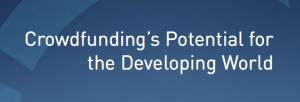 The future of Impact Investing and Crowdfunding was on display in Nairobi, Kenya last week. At the World Bank/infoDev’s annual funding meeting their budget was divvyed up among the creation of Climate Innovation Centers (CIC) in Kenya, Ethiopia, South Africa, Vietnam and the Caribbean and the new funding mechanisms to allow the Bank to effectively seed innovative via crowdfunding.
The future of Impact Investing and Crowdfunding was on display in Nairobi, Kenya last week. At the World Bank/infoDev’s annual funding meeting their budget was divvyed up among the creation of Climate Innovation Centers (CIC) in Kenya, Ethiopia, South Africa, Vietnam and the Caribbean and the new funding mechanisms to allow the Bank to effectively seed innovative via crowdfunding.
CIC’s are incubators training impactful, locally sustainable technology companies. Examples include a biofuel gas stove company that can reduce carbon emissions and black smoke disease and a household filtration system company that recaptures and recycles water allowing women to perform their duties while saving them hours from painstakingly carting water jugs on their shoulders.
RELATED | It’s Here: The World Bank Report On Crowdfunding
The new funding mechanism, called crowdfunding, will use the Internet, technology and the social network to connect would-be entrepreneurs with diaspora money. It will allow investors anywhere to identify a wellspring of opportunity in emerging markets, fund their entrance into incubators, and seed them with capital. The CICs will provide training in management, operational and financial systems, procedures and controls. They will also teach entrepreneurs how to broaden their fundraising efforts via crowdfunding to solicit future growth capital from investors who share similar communities and homestrings. These investors won’t be traditional institutional investors but Africans, Asians and Carabineers who live abroad and wish to remit funds into these investment opportunities from their sofas in Detroit, Michigan or London.
Crowdfunding isn’t just a fad, it is turning out to be a powerful tool to democratize access to capital globally. Research conducted by the University of California, Berkeley shows that funding by the crowd operates in a rational manner (eg: no hype), removes the stickiness of the process (eg: brings documents online, allows multiple parties to diligence and vet at the same time, and facilitates the immediate transfer of information and cash). The industry which only started to gain traction in 2009 is already a multibillion dollar industry that consists of entrepreneurs, fundraising websites, ecosystem players that provide vale added services and of course at the center investors.
 For the CICs and other considering this path the next steps are creating education, training and a funnel of opportunities. This requires the connection of stakeholders in the private sector who focus on teaching entrepreneurship and merging those principals with crowdfunding and accounting. The stakeholders include organizations focused on building entrepreneurial capacity, crowdfunding education companies and tools that facilitate the accounting of businesses and their structures and processes. Sherwood Neiss of Crowdfund Capital Advisors says, “this is how we aim to position our firm. Our firm’s principals are all successful entrepreneurs, who have raised millions of dollars in the private capital markets, hosted successful crowdfunding campaigns and wrote framework for the crowdfunding law.
For the CICs and other considering this path the next steps are creating education, training and a funnel of opportunities. This requires the connection of stakeholders in the private sector who focus on teaching entrepreneurship and merging those principals with crowdfunding and accounting. The stakeholders include organizations focused on building entrepreneurial capacity, crowdfunding education companies and tools that facilitate the accounting of businesses and their structures and processes. Sherwood Neiss of Crowdfund Capital Advisors says, “this is how we aim to position our firm. Our firm’s principals are all successful entrepreneurs, who have raised millions of dollars in the private capital markets, hosted successful crowdfunding campaigns and wrote framework for the crowdfunding law.
Crowdfunding solves pressing problems for both NGOs and developing world entrepreneurs. It answers the question, where do I find capital? It makes the impossible possible. It provides a continuum of funding and community engagement from product to process. And allows investors to enjoy the greatest opportunity for economic value, which is created at the inception and historically limited to the very few.
But crowdfunding doesn’t come without risks. And these risks (lack of oversight, regulation, & policy) can be greater in the developing world. There are ways to mitigate this risk. It begins with standardizing the process, coming up with a standard disclosures, connecting these ideas to co-working spaces, incubators and accelerators that are sponsored by trusted brokers like the World Bank and regulating all this online, via websites that are registered and tied into reporting systems where investors can see how their money is being spent.
In doing so the perennial question of trust and accountability are answered. This is about creating a value chain of opportunities and allowing investors to put their money where their mouth is. Businesses that are successful may not only have access to capital, but strong local resources to guide them and a distribution network of customer and investors for their product.
 Not only are these technologies sustainable but the process by which they are funded is efficient. Consider electricity. There has been a movement in the developing world to decentralize and promote off-the-grid technology that create mini grids. Rather than using mega public funding to finance nationwide electrical infrastructure that take decades and billions, we may now use crowdfunding to create mini funding events and have an impact almost instantly and at a subfraction of the cost. And by narrowing the funding target business models are promoted that are appropriate for a particular village or region rather than tackling national issues.
Not only are these technologies sustainable but the process by which they are funded is efficient. Consider electricity. There has been a movement in the developing world to decentralize and promote off-the-grid technology that create mini grids. Rather than using mega public funding to finance nationwide electrical infrastructure that take decades and billions, we may now use crowdfunding to create mini funding events and have an impact almost instantly and at a subfraction of the cost. And by narrowing the funding target business models are promoted that are appropriate for a particular village or region rather than tackling national issues.
As countries move from donation or perks based crowdfunding to debt and equity crowdfunding policy will need to be addressed. The financing policy environment will be extremely important. Policy controls whether companies can succeed. Where they can do business and how much they can charge for things like electricity. Policy needs to be enabled that allows these crowdfunding ecosystem to flourish. This was the subject of the World Bank’s report Crowdfunding’s Potential for the Developing World.
With $60B in remittances already flowing into Africa a year but often times being immediately spent for goods or safety concerns over hording cash. Crowdfunding may allow diaspora communities to engage directly with locally sustainable businesses that are having an impact and creating jobs and economic prosperity. Crowdfunding will address the gender inequality issue as more female investors back more female entrepreneurs and promotes economic inclusivity particularly for parts of the work that historically have been called “the bottom of the pyramid.” The time is here, the World Bank is taking the next steps. What is your country doing?
 This article was shared with Crowdfund Insider by Sherwood Neiss, Principal at Crowdfund Capital Advisors. Mr. Neiss works with clients ranging from governments and banks that are looking for ways to boost economic development in their countries to investment firms looking for access to increased deal flow that crowdfunding creates. Sherwood serves as an advisor to several crowdfunding platforms and crowdfunding technologies giving him a unique understanding and view of the industry and market.
This article was shared with Crowdfund Insider by Sherwood Neiss, Principal at Crowdfund Capital Advisors. Mr. Neiss works with clients ranging from governments and banks that are looking for ways to boost economic development in their countries to investment firms looking for access to increased deal flow that crowdfunding creates. Sherwood serves as an advisor to several crowdfunding platforms and crowdfunding technologies giving him a unique understanding and view of the industry and market.


